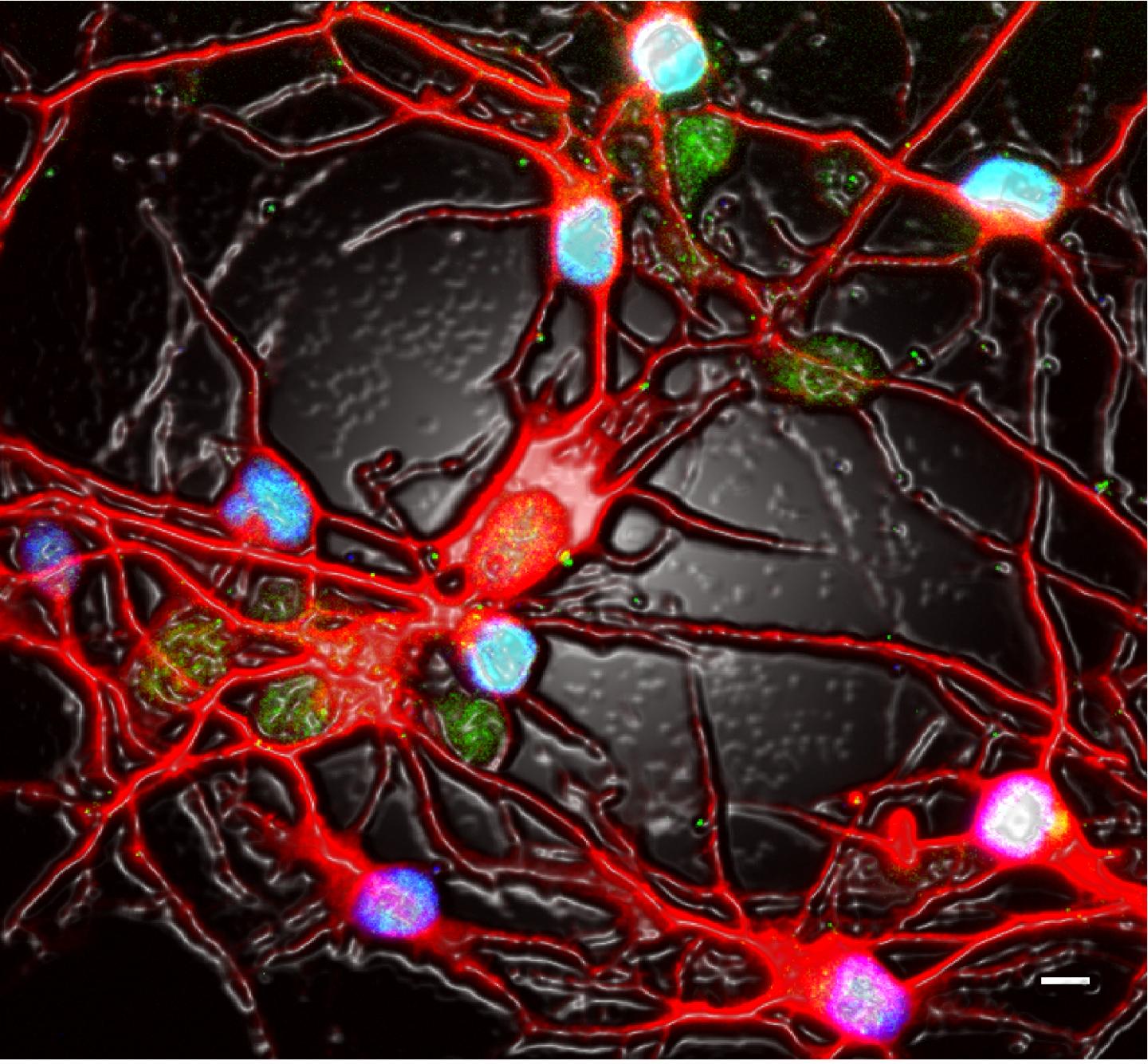Salk study is the first to directly examine cells from patients whose depression doesn’t respond to SSRIs

Credit: Salk Institute
LA JOLLA–(January 31, 2019) The most commonly prescribed antidepressants, selective serotonin reuptake inhibitors (SSRIs), lift the fog of depression for many people. But for around a third of people with major depressive disorder, SSRIs don’t make much of a difference. Now, researchers from the Salk Institute have pinned down a possible reason why–the neurons in at least some of these patients’ brains may become hyperactive in the presence of the drugs. The study appeared in Molecular Psychiatry on January 30, 2019.
“This is a promising step toward understanding why some patients don’t respond to SSRIs and letting us better personalize treatments for depression,” says Salk Professor Rusty Gage, the study’s senior author, president of the Institute, and the Vi and John Adler Chair for Research on Age-Related Neurodegenerative Disease.
Depression affects 300 million people around the world, and more than 6 percent of the US population experiences an episode of major depressive disorder (MDD) in any given year. MDD has been linked to an imbalance in serotonin signaling, although the exact mechanism is not well understood.
When brain cells signal with serotonin, the neurotransmitter is released from one cell, binds to receptors on neighboring cells, and is then transported back into the first cell. SSRIs increase levels of serotonin available for signaling by blocking the transporter that normally moves serotonin back inside cells, in a process known as reuptake.
Gage and his colleagues at Salk, along with collaborators at the Mayo Clinic, studied the range of responses to SSRIs in 803 patients with MDD. From this group, they selected three patients who achieved complete remission of their depression symptoms with SSRIs, as well as three patients with no improvement in their depression after taking SSRIs for eight weeks. The researchers isolated skin cells from all of these patients and from three healthy control subjects. They used stem cell reprogramming techniques to turn the skin cells into induced pluripotent stem cells (iPSCs), and from there into neurons.
“What’s exciting is that we could look directly at human cells, neurons that are not usually accessible in living patients,” says Krishna Vadodaria, a Salk staff scientist and first author of the new paper. “We can finally tap into the potential of looking at neurons from individuals whose medication histories, genetics and response profiles we know.”
The researchers studied how the neurons derived from each person responded to increased levels of serotonin, mimicking the effect of SSRIs. When serotonin was present, some neurons derived from SSRI non-responders had significantly higher activity on average compared to the neurons of healthy individuals or SSRI responders.
Further experiments pointed the team toward two particular serotonin receptors (out of seven known in the human brain), 5-HT2A and 5-HT7. When these receptors were blocked with a chemical compound, the neurons of non-responders were no longer hyperactive in the presence of serotonin, suggesting that drugs targeting these receptors may be effective alternates to SSRIs in some patients, but more research is needed.
The methods used in the new paper can be more broadly applied to other subsets of patients with depression, the researchers say.
“I hope this opens the door to many more studies of individuals who are extreme cases in terms of how they respond to treatments,” says Vadodaria. “In turn, that will help us understand major depression in the broader population.”
###
Other researchers on the study were Apua Paquola, Callie Fredlender, Kelly Heard, Yalin Deng, Amy Le, Sonia Dave, Lianna Fung, Xinyi Li and Maria Machetto of the Salk Institute; and Yuan Ji, Michelle Skime, Timothy Nelson, Daniel Hall-Flavin and Richard Weinshilboum of the Mayo Clinic.
The work and the researchers involved were supported by grants from the Robert and Mary Jane Engman Foundation, Lynn and Edward Streim, the Takeda-Sanford Consortium Innovation Alliance grant program, a Swiss National Science Foundation (SNSF) outgoing postdoctoral fellowship, a Minnesota Partnership Award for Biotechnology and Medical Genomics, an NIH-Mayo Clinic KL2 Mentored Career Development Award (NCAT UL1TR000135) and the Gerstner Family Mayo Career Development Award in Individualized Medicine.
About the Salk Institute for Biological Studies:
Every cure has a starting point. The Salk Institute embodies Jonas Salk’s mission to dare to make dreams into reality. Its internationally renowned and award-winning scientists explore the very foundations of life, seeking new understandings in neuroscience, genetics, immunology, plant biology and more. The Institute is an independent nonprofit organization and architectural landmark: small by choice, intimate by nature and fearless in the face of any challenge. Be it cancer or Alzheimer’s, aging or diabetes, Salk is where cures begin. Learn more at: salk.edu.
Media Contact
Salk Communications
[email protected]
858-453-4100
Original Source
https:/
Related Journal Article
http://dx.




